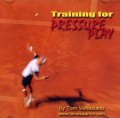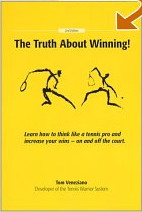In your quest to develop tennis mental toughness, you should beware mental traps and make decisions to protect yourself from them. Though they may seem small and innocuous, decisions you make now will affect your options in the future. Certain choices can set in place harmful mental trends.
For instance, let's analyze a player's natural inclination after playing poorly and then demonstrate how his or her decisions develop a mental trend that affects match play. Most often, players are totally oblivious to this link between their practice and match play.
Every week, whether a player has played brilliantly or miserably, whether they have won matches or lost, going back to their training routine is crucial. Sounds simple enough, but when a player has had a poor week of tennis, they often struggle to maintain their training program. Why? Because they do not feel motivated to get into the grind and train. As a result, they mentally make one of three decisions.
1. They skips their next one or two training sessions.
2. They train but are listless and do not give it their all.
3. They practice and are motivated, but all their energy is directed toward quick-fix solutions in which they frantically try to solve problems.
What these three decisions create are mental obstacles in a player's mind. These obstacles, in turn, block the correct mental attitude in future match play. The player unknowingly affects their long-term thinking that is paramount in their mastery of mental toughness. Let's go over these decisions one by one.
1. A PLAYER SKIPS THEIR NEXT ONE OR TWO TRAINING SESSIONS
When a player skips their training sessions after a bad week, they mentally conditions themselves to give up when things get tough. They create a mental habit and sets a trend in place that will show up in match play. When things get tough or do not go their way in a match, they will check out. They'll mentally go home! They may still be on the court playing, but their mind will be miles away. They could stay with this mindset for ten minutes, twenty minutes or even a whole match! The mental trend that was created by skipping training sessions becomes the mental attitude that moves right with them in match play. After all, you take your thinking with you wherever you go!
2. A PLAYER TRAINS BUT IS LISTLESS AND DOES NOT GIVE IT THEIR ALL
In this situation, the player shows up to their training sessions but is mentally absent and spiritless. Like the previous player, this player will be in trouble when things get tough in future matches. Their listless mental habit in practice will transfer into low mental energy in match play. They will not totally check out but will maintain a weakly positive mental attitude that could collapse when the next negative storm hits. Everything must go well, or else! Their mental trend of listless practices will be evident in their match play, and yet they will never connect the two. If this happens to you, you now know the answer. It's all about your prior decisions.
3. A PLAYER PRACTICES AND IS MOTIVATED BUT DIRECTS THEIR ENERGY TOWARD QUICK-FIX SOLUTIONS
This scenario often happens when a player has had a bad week and wants quick answers to their problems. They train in a frantic search to find solutions and turn their disastrous week into a success. This is a misguided attempt to quickly make their fragmented mental attitude whole again. It never works! They should continue their normal, intense practice sessions and in time let the process solve these problems.
How does this mental trend affect match play? Suppose the player has developed the perfect strategy and is carrying out their well-orchestrated game plan in a match. Then, for five or ten minutes things do not go well. All of a sudden, the frantic search for a new strategy begins. They erratically try this strategy or that strategy, and consequently lose their focus. The inevitable result is disaster! By changing their training habits after a poor week, the player set a mental trend that affected their match play. They should have stayed with their match strategy through those ups and downs inherent to match play and slowly let the plan work. Changing strategy too soon is not the answer. You must first let the process take root and grow, weathering the bad conditions and the good.
The bottom line is, the decisions you make after a poor week of tennis can be crucial to your mental toughness conditioning. Although these decisions may appear harmless, they can easily turn into a mental trend that will affect your match play. You can avoid all of these negative mental trends by simply maintaining your intense training program though thick and thin.










 You will join 13,000 other subscribers in receiving news of updates to the Tennis Server along with monthly tennis tips from tennis pro Tom Veneziano.
You will join 13,000 other subscribers in receiving news of updates to the Tennis Server along with monthly tennis tips from tennis pro Tom Veneziano. 